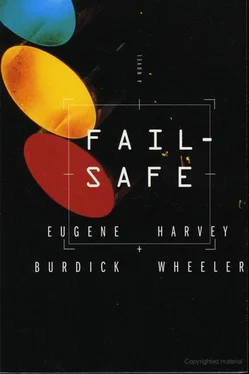Then Colonel Cascio turned and looked at him full face. That look was enough. For a change had taken place. The hard, fixed stare was back in Cascio’s eyes. Colonel Cascio was mad, crazy. The heat was gone from General Bogan’s mind. Slowly he came to an upright position. He smiled the smile of a civilized man at Colonel Cascio.
“Colonel, you may not be aware of it, but you are talking mutiny,” General Bogan said quietly. “One more exchange like this and I will have you taken from the War Room.”
Colonel Casdo nodded, but his expression remained rigid.
The President’s voice flooded back into the room. “General Bogan, will Group 6 break radio silence as they approach Moscow?”
“Yes, sir, just before they get within lob range of their target they have insu&ictions to open regular radio communications.”
“And when will that be?” the President asked.
General Bogan calculated quiddy, “Well, sir, it should be just about any time now.”
“Very well,” said the President, “make arrangements for me to talk personally with the commanding officer of Group 6 as soon as he reopens radio communications.”
“Very well, sir.” Bogan pointed a silent order to Lieutenant Colonel Handel, who rushed from the room to make the necessary arrangements.
The light on the “touch” phone went on. A voice spoke quickly in Russian, the translator overriding the Russian, translating even as the other voice spoke.
“This is Marshal Nevsky in Ziev,” the voice said.
“We recently developed a radar-masking device which is installed on all our bombers. It picks up enemy radar signals and automatically distorts them. When your radar signal comes back it has been skewed anywhere from five to one hundred miles. We assume your planes have similar devices. Does your detection apparatus also pick up an incorrect location?”
“No, sir,” General Bogan said. “On our plotting boards we have the correct latitude and longitude of our planes because of a compensating device on our radar which automatically corrects the radar signal which comes back from our planes.”
General Bogan knew what the next question would be.
“Can you give us the longitude and latitude of the three planes left in the air?” Marshal Nevsky asked.
“We can do that, but we cannot give you their altitude,” General Bogan said. “We have not been able to correct our altitude.determining radar to compensate for the distorting signals from the planes.”
“Will you please give us the position of the three planes?” Marshal Nevsky asked. “We can fly fighters at various altitudes once we know their approximate position.”
General Bogan felt weary. He leaned forward to push the lever which would open the intercom to the appropriate desk-console. Suddenly there was a stunning pain against his skull, a ringing in his ears; the room reeled and he had the quixotic impression that electricity had suddenly poured out of the telephone into his head. He was on the floor staring up at the lean contorted face of Colonel Cascio. And Casdo was talking in a firm and authoritative voice over the War Room intercom, the heavy crystal ash tray with which he had hit General Bogan still in his hand.
Group Commander Grady flew in total blackness, broken only by a single glowing scope. This scope combined both range and altitude radar results in such a way that it gave a stereoscopic image of the terrain ahead of them. At this altitude and speed the eye could not perceive a hill or tree or power line or smoke stack in sufficient time to take evasive action. But the scope picked out even the smallest raised obstades and projected them blackly on the screen so that Grady merely had to lift the plane at the indicated spots to clear.
Occasionally when the scope showed fifty or sixty miles of dear terrain ahead, he glanced out of the windows into the quiet Russian night. He could see the lights of villages. Trucks and cars moved along highways. Occasionally the lights of a factory would glow in a great complex. Somehow the sight of normal activity disturbed Grady. He knew that a blackout was no protection against a nuclear bomb but it was also clear that the Russians were making no attempt to go to their bomb shelters.
Grady was beyond the point of rational analysis. The stress of fighting off the Soviet attacks, the bitter and blunt fact of watching his own planes go off in great smears of blast and light—all of this had reduced him to a tough, skeletal, and very single-minded person. He knew only one thing: get to the target.
“How is No. 2 plane doing?” he asked the Defensive Operator.
“She is hard to track so low but occasionally I can catch her,” the operator said. “She’s about fifty miles away and at nine o’clock. I think she may be losing a little speed and might be damaged.”
“In a few minutes we will be at lob range. Let me know five minutes before we get there,” Grady said. “We can come up on the TBS and find out what shape she is in then.”
At lob point the Vindicators could elevate their noses, turn to afterburners, and “lob” their bombs onto the target. The “lob” distance could, depending on speed and missiles, range up to fifty miles. If they broke radio silence before that time there was a possibility that the Soviets would launch rockets designed to run the reciprocal of a radio beam and home in on the Vindicators. Once they approached the lob range, however, SAC headquarters wanted to know it, for it was virtually a certainty that the bombs could then be delivered and an evaluation made of the American strike. Past the lob-range point the planes were also free to communicate with one another if they desired.
“Six minutes to lob point,” the navigator said. On the terrain scope a long, low range of hills came up slowly. They were twenty miles away and they would be reached in approximately forty seconds. Grady began to lift the nose of the Vindicator slightly.
“We are five minutes to lob point,” the navigator said triumphantly.
“Turkey 2, Turkey 2,” Grady spoke into the TBS microphone. “This is Turkey 6. What is your condition?”
“Turkey 6, this is Turkey 2,” a voice said with remarkable distinctness. “We have suffered some slight wing damage because of shrapnel, but all it has done is reduce our speed. We are down to 1,350 miles an hour and the drag seems to be even.”
“Turkey 2, our condition is excellent,” Grady said.
“As far as I know we have not been hit. We are now four minutes to lob point and I am going to report to base.”
Grady reached forward and picked up another microphone.
“Ultimate No. 2, Ultimate No. 2.” Grady said crisply. “This is Turkey 6. Do you hear me?”
“We read you five by five,” a dear voice said in his ear. “We have a message for you.”
“I am not authorized to receive messages,” Grady said. “I am merely reporting that we are approaching the lob point and are undamaged.”
A new voice broke in over Grady’s radio. He recognized it immediately. An involuntary shock went through his body. The voice he heard was that of the President. But it could not be. He glanced at the Fail-Safe box. The “go” signal was clear and reassuring.
“Colonel Grady, this is the President of the United States, your Commander in Chief. The mission you are flying has been triggered by some mechanical failure. I order you and the other planes under your command to return to your base immediately.”
Grady sat stunned, disbelieving. He did not speak. His hand moved toward the radio toggle switch, stopped three inches short. He looked at it. The hand dropped to his knee.
Grady looked at the navigator and then at the defense operator. They had also heard the message. Their eyes were fixed coldly upon Grady. He felt helpless. He was sinking. He wished he were somewhere else—anywhere else. He wanted to cry. His mind moaned a piteous complaint and abdicated; subconscious emotions were welling up within him and he was in their control. He reverted to childlike thoughts. He wanted God. He was a little boy who needed his mother. He wanted to dose his eyes-to dose out this nightmare and open them again as that little boy. He tried. He dosed his eyes. He opened them. No, it was true. The voice came back over the radio at him.
Читать дальше











